|
The majority of the key people who lived this conflict compiled their memories and published them. Their vision of the events are worth reading in parallel with the one of the small soldiers, since the acts of those famous men who worked out the strategies and policies, often decided the life and death of thousands of individuals. Seen from the trenches, these 'celebs' were very often considered guilty for having caused the misfortune of the soldiers. But if you had had their level of responsibility, and involved in the infernal mechanism of August 1914, would you have acted differently? Make your own judgement !
I also inserted in this page the memories of some minor actors of 14/18, but actors who were going to play a significant role afterwards. Everybody knows that WW2 finds its roots in WW1... It is thus without any sympathy, but preoccupated with exhaustiveness that you will find a reference that includes some the war memories of the infamous Adolf Hitler.
On the side of the allied powers
The first speaker is the winner. Often subject to debates, these leaders at least have the advantage to have driven their soldiers towards the victory. But was it worth the payed price ? …
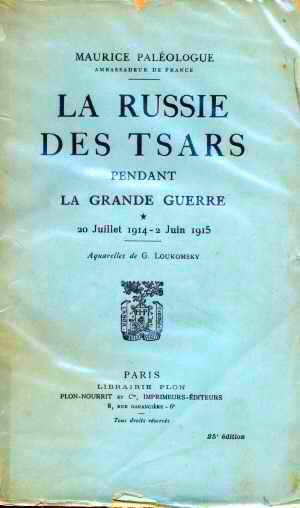 |
Maurice Paléologue was the France ambassador sent to the Tsar of Russia from July 1914 to May 1917. Well placed witness of the general explosion of 1914, observer of the war on the eastern front and of the decrepitude of the Tsars world living his last moments, careful commentator of the western front news, this testimony is of capital importance for the History. And since the pen is talented, some kind of passion follow you when reading these memories all along the 3 volumes of "Russia of the Tsars During the Great War" (1921). |
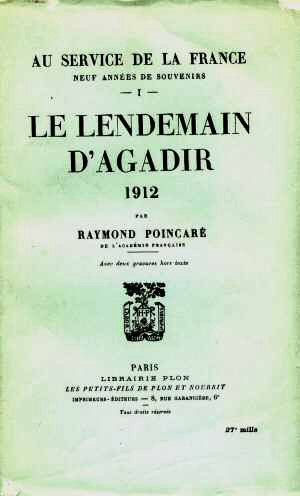 |
Written between 1929 and 1933, the 12 volumes memories of French President Raymond Poincaré, born in a small Lorraine village, those pages bring a good lesson. Foreign Minister until 1913, it assumed the responsibility for President of the Republic of 1913 to 1920. In « Au Service de la France » (At France Service), you will discover not only the discussions and decisions that made the History, but as a distressed man, much more anxious of the bleeding imposed to his people than it was visible during the conflict. |
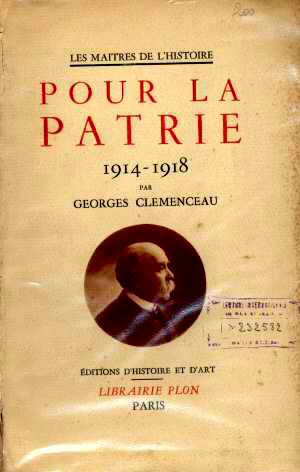 |
Born in 1841, George Clémenceau was 76 years old when, in 1917, he became in President of the National Council. Emblematic face of the French radical socialists, his energy and savage determination ("I’ making War") were worth the nickname of "the Tiger". He was one of the actors who allowed France to pass from the failure of the Chemin des Dames in 1917 to the final victory in 1918. His popularity was then at the top. But some also think that his obstinacy gave to the Versailles treaty its ‘dead end’ configuration that prepared the reach of Hitler. Quite an eloquent man, he published several books with his memories or speeches, including "For the Fatherland" (1934) and "Majetsty and Miseries of a Victory" (1930). |
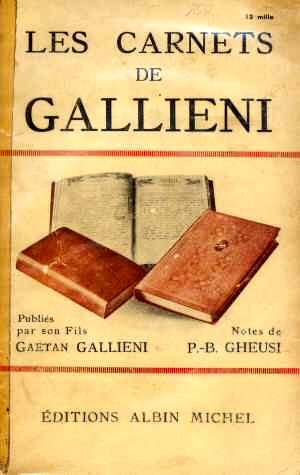 |
At 65 years old, Joseph Gallieni had his military career behind him when he was named Military Gouverneur of Paris in 1914 at the time when many thought that the German troops would soon enter Paris. His intuition took a large part in the Victoiry of the Marne. Very popular, He was then named War Minister, but died of illness in 1916. Marshal Joffre Marshal, leading the French Armies did not regret it, Galliéni criticizing more and more openly his expensive control of the War. His 'Carnets' ('Notebooks') were published by his son in 1932. |
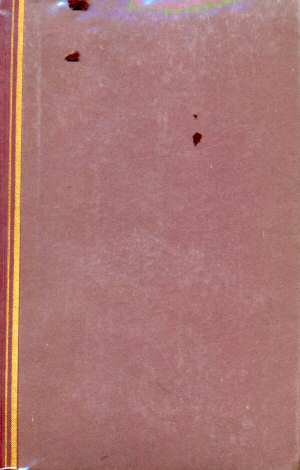 |
Quite a discussed character, it must be agreed though that the coolness of Joffre Marshal, Ordering as the Head of the French Armies from 1914 to 1916, had a major role in stopping the Kaiser’s troops only 60 km to Paris in September 1914 during the battle of the Marne. This imperturbable confidence was less effective afterwards and led to the vain offensives of 1915, perfectly illustrated by his famous sentence "I nibble at them...", if scandalous in the eyes of the french « Poilus ». He was replaced by General Nivelle in at the end of 1916. He published his 'Mémoires' ("Memories") in 1928. |
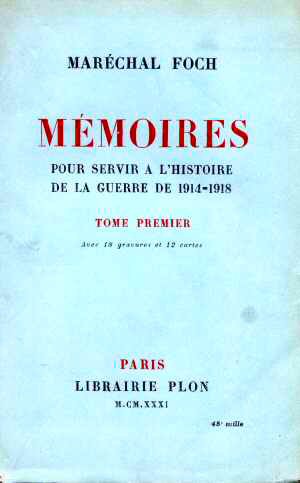 |
Foch Marshal finished the War in 1918 with a laurel wreath, Head Commander of the Allied Armies. Before gaining this ultimate title, he has been in 1914 the main operational actor of the victory of the Marne, then victorious General in Flandres (1914) and on the French front of the Somme offensive (1916). His 'Mémoires pour Servir à l'Histoire de la Guerre 1914-1918' ("Memories to serve the History of the War") (1929) in two volumes are undoubtedly those of a self confident winner. |
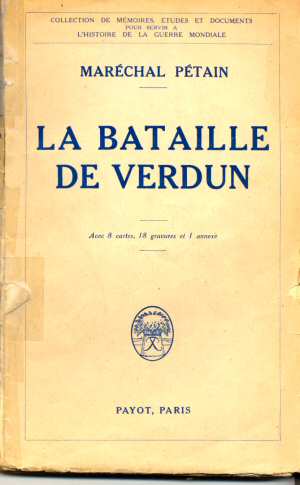 |
During a single men’s life, Philippe Pétain succeeded in being successively the hero of a nation, then the hated symbole of the french collaboration from 1940 to 1944. For the period that is of interest for us, not doubt allowed: having gained operational successes in Artois in 1915, General Pétain was retired because of his age. Recalled at the more despaired moment of the battle of Verdun to lead the operations (giving the subject for his memories 'La Bataille de Verdun' ("the Battle of Verdun") - (1929), he restored the frontline and saved the endangered city. Too much a defensive mind to please Joffre’s taste, he was replaced by Nivelles... and afterwards replaced this latter as head commander of the French Armies in 1917 after the failure of the Chemin des Dames offensive. He then succeeded in restoring the french army morale, stopping the critical mutinies crisis. |
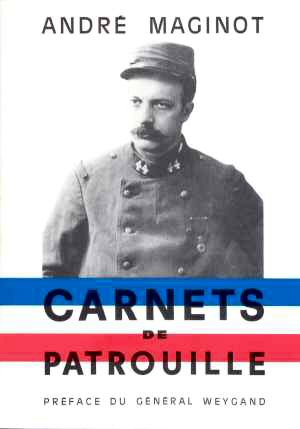 |
Before receiving for two times, the responsability of War Minister of the French government in the Twenties, and giving his name to the formidable line of fortifications that faced the German border and was turned by the IIIrd Reich Armies in 1940, André Maginot was enrolled as infantry officer in August 1914. Wounded at the end of 1914 during a patrol near Verdun (an imposing monument located close to the Sainte Fine Chapel commemorates this event), he was disabled. His 'Carnets de Patrouille' ("Patrol Notebooks"), written in 1915, report this period. It should be noted that he also published a guide: "La Bataille de Verdun Expliquée sur le Terrain" ( "the Battle of Verdun Explained on the Field"). |
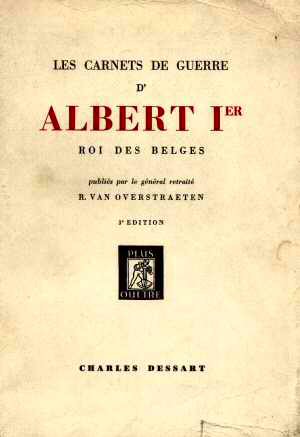 |
Knowned as the « King Chevalier », Albert Ier, King of the Belgians, is one of the of the First World War. When, in accordance with the Schlieffen plan that guided the flow of the German troops through the neutral Belgium to turn the French Army, Germany required the right to penetrate on its territory, the King decided to refuse it, and engaged the fight with his small army. Entrenched in the western end of the Flanders, he stayed at the head of his troops, and finally entered as a liberator in Brussels in 1918. His 'Carnets de Guerre' ("War Notebooks") (1953) were published much later and confirm his great uprightness and the great human concern of his character. |
 |
At the death of Lord Plummer in 1915, Sir Douglas Haig was ordered Head of the English Forces on the French and Belgian front. He will remain at that position until 1918. Inhabited by an iron will, he directed his troops with an iron hand against winds and tides towards the final victory. His detractors are numerous, who criticize his lack of humanity and self-criticism, his contempt of the other nations, and his little consideration of the human losses. Its 'Carnets Secrets' ("Secret Notebooks") (1964) tend to confirm these defects as well as his will to win. |
Coming soon, some other allied celebrities :
Charles de Gaulle
On the side of the central powers
Let us now give some place to the personalities who led the defeated nations and troops, or who will take responsabilities afterwards. In their case, the writing of memories is quite a more difficult exercise, since they are unable to justify some difficult decisions by the reach of the final victory. Vae Victis...
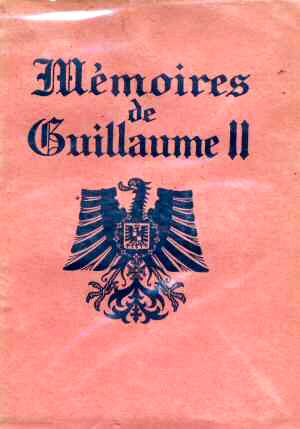 |
Exiled on a small Dutch island in 1918 after his abdication, the Kaiser Wilhelm II had some time to write his memories. Naturally autocrat, lately but surely seduced by the pangermanists, he led Germany to the War in 1914 by following a calamitous international politics. Bad alliances, aggressives attitudes, national ambitions, he is, even if he tries to deny it in his "Memories", one of the biggest warmongers. Those words are especially interesting by the role he held during the years before the war. |
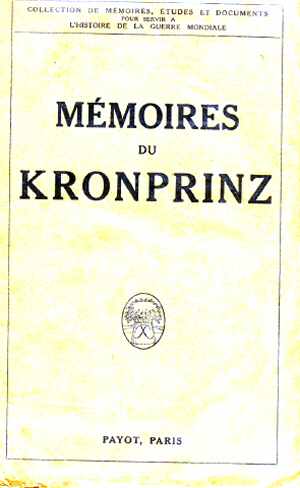 |
Elder son of the Kaiser Wilhelm II, Friedrich-Wilhelm-Victor-August-Ernst von Hohenzollern was 32 years old when the war exploded. Copiously scoffed and caricatured by the allied press, even if the escapades of his way of life could shock the front fighters, it must be admitted that he was finally a good soldier. Among other things, he led the German armies on the front of Verdun in 1916. The History - and his "Memories of the Kronprinz" - even reveal quite a cultivated spirit, and much less enthusiasm with the war than his father had. He will follow this latter in his Dutch exile in 1918. |
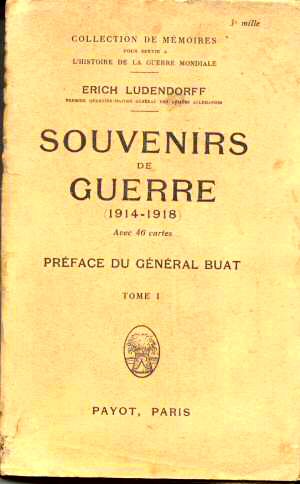 |
The Hindenburg/Ludendorff pair having prove its effectiveness on the eastern front in 1914 and 1915, it was put in charge in 1916 of the supreme command of all the German armed forces. The witness of the general Ludendorff, transcribed in the two volumes of "War Memories" (1920), is consequently very interesting. After the war, Ludendorff sympathized with the national-Socialists, and launched with Adolf Hitler the missed putsch in Munich in 1923. It must be noted that he wrote in 1930 another rather odd book, named "1932, the War", in which Germany fights at the sides of England the Freemasons and catholics gathered around France, Italy and Poland... |
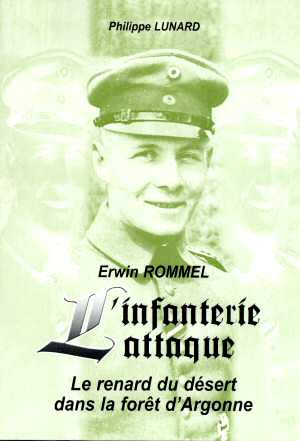 |
It is with a undeniable enthusiasm that Erwin Rommel, young career officer of the wurtemburg infantry went at war in 1914. He was to be considered as a hero there, taking part in the fights in the Argonne, in Alsace, Romania and Italy. His memories published in 1937, entitled "the Infantry Attacks", are very precise and detailed, even if the laudatory comments for the German infantryman compared to his French equivalent can sometimes be weary. The future "Desert Fox" was noticed by Adolf Hitler only in 1938, with the reading of this work. These are thus the lines which gave to the future Marshal of Reich the command of an armoured unit which, in 1940, broke through in the Ardennes... |
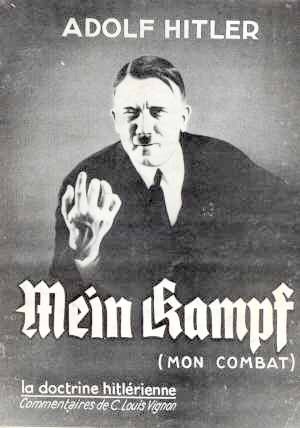 |
Simple Corporal in the German Army on the western front during the first world war, it would be wrong to say that Adolf Hitler was a 'celeb' during this conflict. Rewarded with the iron cross, he was convalescent after a gaz intoxication when the armistice was announced. "Mein Kampf", messy work, dripping with premonitory hate, written in prison in 1924, is far from talkative on the experiment of war of the future and malefic "Führer", but it shows clearly that a part of this terrible character was forged in the horror of 1914-1918, and that it benefitted from the revolyt feeling caused in Germany by the treaty of Versailles to seduce the opinion. |